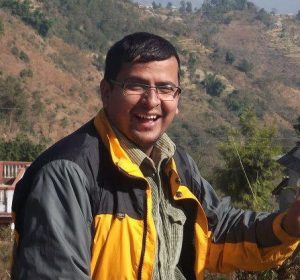
Writing is one of the important language skills. A piece of writing communicates our feelings, emotions and ideas. In order to develop the writing skills of our students, we can ask them to take notes, summarize and answer questions given in the textbooks. Likewise, dairy maintaining, writing travelogues, reflection, and journals improve their writing skills and helps them build confidence to express their feelings and ideas. Particularly students can perform their language ability, record their critical moments. As a teacher, we can motivate our students to do these writing activities.
My experiences and feelings
In my experience, teachers and students in Nepal, particularly from government schools, hesitate to write an academic piece in the English language. It is perhaps because of not having enough grammar skills and having the limited vocabulary. I believe that the grammar skills and vocabulary in any language are fundamental to compose a piece of writing in that language.
I am aware of the school and community environment where the Nepali language is the major language leaving many other indigenous languages in different ethnic communities. I rarely encounter someone speaking English on my way around the school and community. However, the current generation of children in Nepal would like to learn English and develop skills of the English. But there are so many issues behind it. I have tried to collect some information from students about current challenge of teaching writing skills in community schools. One of my students said, “I can’t write what I feel. I feel writing in English is hard, how to start to answer questions. I don’t get an idea how to start.” The English language is not a common language of conversation Nepal. Around 123 languages are spoken Nepali being the national language in this multilingual country. The English language is learned in the classroom and is limited in the classroom. Hence, it is obviously challenging for children to attain the advanced skills in the English language including the writing skills. However, teachers can try out some ways of teaching writing skills in their classrooms. The teachers can start with asking students to copy something with good handwriting, then gradually assign them some guided writing practice. Once they are confident with guided writing and able to compose appropriate and accurate sentences structures, now we can slowly introduce creative writing to them. Perhaps creative writing helps strengthen their writing skills. Teachers can provide their students with various writing opportunities in different fields like essays, letters, story development, paragraph writing, dairy writing, travel journal writing.
One of my students expressed the difficulty of writing in English, “I can’t write properly because I don’t understand many types of word meaning. How to find out the difficult word meaning?” As a teacher, we always have pressure to complete the curriculum in each academic session. I repeat the same book in the classes each year. There is no provision of additional books to enlarge the vocabulary of students. Extracurricular activities are also conducted for the formality only. English subject related activities such as essay writing, story writing, English debate competition, word meaning, spelling context, etc. get less priority. I think the school administration should manage extra classes for writing after the consultation with parents. Sometimes, guest resource persons of writing should be haired for inspiring the students for experience sharing and writing. On the other hand, the teachers also can do some activities to encourage students like diary or journal writing competition. Then, the good writings can be displayed on the school notice board or wall magazine. Likewise, the teachers must be update-to-date with the new trends of teaching writing effectively to the students.
After the students write, the teachers must read and offer feedback for rewriting if necessary. Generally, the writing process of our students never goes around another cycle. They just write once. Teachers mark the writing and what. Nothing. The process stops there. Actually, teachers must orient their students about the writing process and cycle. The first writing is the first draft and it should be rewritten if necessary. The role of teachers is very vital in reading the composition, offering the feedback and encouraging them to rewrite.
Most of the students are eager to learn the English language. They know the importance and scope of the English language but their foundation is very weak. One of the reasons behind this is the teachers’ own proficiency in English language. Some teachers (of course not all) have problem in composing a good paragraph and conversing in English with their students and colleagues. One of my colleagues expressed that, “There is no English environment in community school. All the students should speak English in their school premises.” It made me think further about learning and teaching the English language. I would imagine that my colleague has an overwhelming concept of educating children, but his expression reflects that he needs to differentiate between the English language and education. If he is teaching the English to his students in the classroom, he has to focus on the language. The increasing shift to English medium instruction from Nepali in the classroom has rather influenced the students’ Nepali language learning and learning of other subjects such as Science, Mathematics, Social Studies and History. The strategy of imposing the English as a medium of instruction in the classroom raised a question: are we teaching the English language? On the other hand, despite using English as a medium instruction, the writing of students is not satisfactory. And it is obvious that the demand of writing composition is going to be increased with the introduction of English medium instruction. Therefore, we need to review and rethink our method of teaching writing to the children.
Bimal Khanal is an English teacher in a community school in Kathmandu. He is also a freelance researcher.